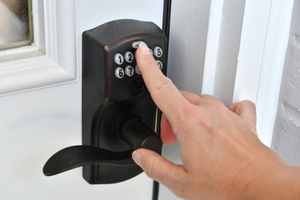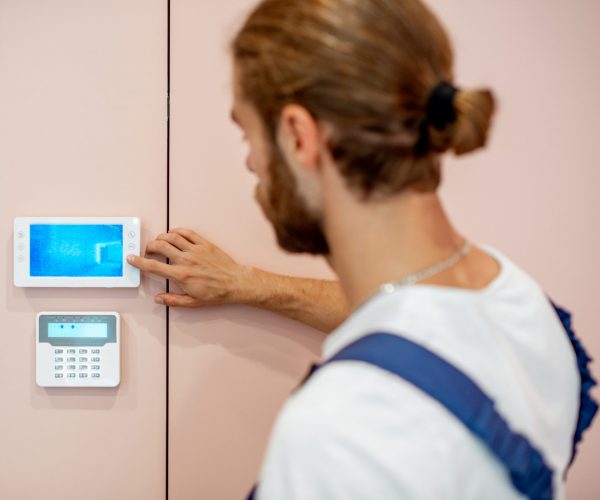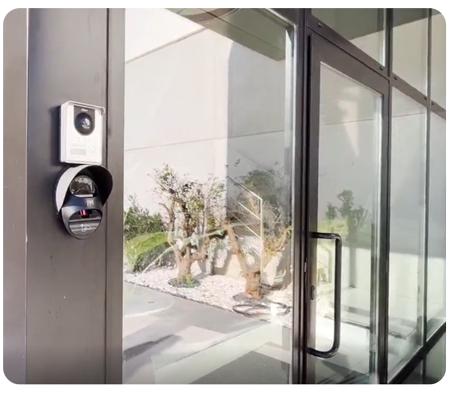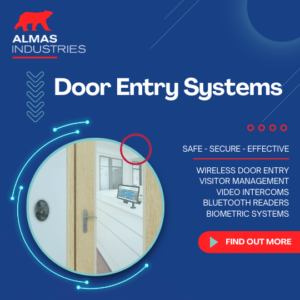
How to Choose A Door Entry System
When it comes to securing your commercial premises, the door entry system you choose plays a pivotal role in safeguarding both assets and personnel, plus it’s your users’ first interaction with your business. A good user experience sets a professional tone from start, a poor one creates frustration straight away. At Almas Industries, we understand that selecting the right solution can be a complex undertaking.
This comprehensive FAQ addresses the questions we are often asked concerning door entry systems for commercial environments and will help you make well-informed choices for your site’s security needs.
We will cover different types of door entry system and their pluses and minuses, cost, maintenance, components, compliance and what’s next in for the future of all things door entry.
What Are Door Entry Systems?
Door entry systems, often colloquially referred to as access control systems, serve as the linchpin for security in commercial spaces. At their core, these systems control and manage access points, usually doors, to ensure that only authorised personnel can enter specific areas. But that’s just the tip of the iceberg. The sophistication and capabilities of door entry systems have grown exponentially with advancements in technology, offering an intricate blend of security, convenience, and data analytics.
The Basic Mechanics
In its simplest form, a door entry system replaces or augments traditional lock and key mechanisms with electronic components. The system may require a user to present a digital credential, such as a key card, fob, or biometric identifier, to gain access. Once the system verifies the credential, it unlocks the door, thereby ensuring that only authorised individuals can enter. Read our blog for more on the specific core components of a door entry system.
A Guide To Door Entry Systems

From keys to biometric face scanners, video intercoms to Bluetooth readers, the right system for your business will depend on many factors, read our comprehensive article discover more about The Different Types of Door Entry Solutions available and the factors that will influence your choice.
A pin code system is cheap, but will it give you the security and control you need?
How Much Do Door Entry Systems Cost?
There are different components to the cost of your new system or upgrade. The cost of the core components, the installation and a potential reoccurring cost of the software that drives the system. The overall cost of the project will of course vary depending on the size of your site, the number of doors, the overall level of control that you want and the level of security that you need. We do a deep dive in our blog on the cost of door entry systems.
Door Entry System Installation and Maintenance Considerations
As business owners in the UK and Ireland increasingly turn to advanced security measures, door entry systems have become a key part in safeguarding commercial premises. However, the effectiveness of any access control system is contingent upon its correct installation and ongoing maintenance. Below, we unravel the essential considerations surrounding these crucial aspects.
Installation Considerations

Installing a door entry system is far more than a ‘fit-and-forget’ task. It requires meticulous planning and expertise. Here’s what you need to consider:
- Site Survey: Conduct a thorough site assessment to identify vulnerable access points and determine the type of door entry solution best suited for your premises. Alternatively get a security supplier to do this for you. They will probably identify risks that you just don’t appreciate because you walk through the site every day.
- Compliance: Ensure your chosen system meets local and national regulations, including GDPR for data protection and adherence to relevant British and Irish standards.
- Professional Installation: Always opt for professional installation services, as DIY attempts can result in faulty setups that compromise security. Your supplier should have relevant certification from a recognised security body in the UK or Ireland.
- System Testing: Post-installation, the system must be rigorously tested to verify its operational efficacy and to ensure it meets your security requirements.
Maintenance Considerations
Regular maintenance is vital for the longevity and reliability of your door entry system. Here are the maintenance aspects to keep in mind:
- Regular Audits: Conduct periodic system audits to identify wear and tear or any signs of tampering. Also, do a sense check once a year to see if the way people and vehicles move through your site has changed. Is the set up still providing a good user experience for your staff, visitors and contractors?
- Firmware Updates: Keeping the system’s software up-to-date is critical for enhanced security and new features.
- Professional Servicing: Schedule annual inspections by certified professionals to ensure the system is in optimal working condition.
- Backup Systems: Always have a backup power supply and a manual override system to maintain functionality during power outages or system failures.
Partner with Experts
Given the technicalities involved in installing and maintaining electronic door entry systems, it’s advisable to partner with industry experts for an end-to-end solution. It’s not just about buying the latest technology; it’s about ensuring it works flawlessly to protect your assets and personnel
Compliance Requirements and Regulations for Door Entry Systems in Commercial Premises
Ensuring that your commercial premises meet all legal obligations is a non-negotiable aspect of installing a door entry system. Not only do you need a system that is robust and effective, but it also must comply with a host of regulations ranging from data protection to building codes.
Data Protection and GDPR
Since many modern door entry systems collect and store personal data—especially those using biometrics or smart cards—it’s crucial to comply with the General Data Protection Regulation (GDPR) and UK GDPR. This involves securing any stored data effectively and having a clear policy regarding how the data will be used. You can read more about Security and GDPR here.
British and Irish Standards
In the UK, door entry systems often need to comply with various British Standards such as BS EN 50133-7 for access control systems. Irish regulations may include standards like I.S. EN 50133-1.
The standard defines the criteria for automated access control systems and their components within and around buildings, including:
- Overall system architecture and general requirements for security-focused access control systems;
- Functional specifications; including electrical safety and operational reliability.
- Stipulations for environmental and electromagnetic compatibility;
- Communication requirements between an access control system and other systems, such as actuating mechanisms at access points, sensors, and alarm systems.
Health and Safety Regulations
Both the UK and Ireland have robust health and safety regulations that cover the safe installation and operation of door entry systems. This includes ensuring that all installations are carried out by qualified personnel and that the systems do not pose a risk to users or other individuals on the premises.
In the UK and Ireland, the installation of door entry systems in commercial premises must adhere to a set of health and safety regulations to ensure the well-being of both installers and end-users. Below is a comprehensive guide outlining these regulations.
Health and Safety at Work Act 1974 (UK)
This is the primary piece of legislation covering occupational health and safety in the UK. It mandates that employers must ensure a safe work environment, which extends to the installation and maintenance of door entry systems.
Safety, Health and Welfare at Work Act 2005 (Ireland)
This Irish Act is comparable to the UK’s Health and Safety at Work Act. It sets forth general principles for the management of safety and health, including those related to the installation of security systems like door entry systems.
Work at Height Regulations 2005 (UK)
If the installation of a door entry system involves work at height, these regulations come into play. They cover the minimum safety and health requirements for the use of equipment for work at height.
Electrical Safety Regulations
In both the UK and Ireland, electrical safety standards are crucial, especially when installing electric door entry systems. Relevant standards include the IET Wiring Regulations (UK) and National Rules for Electrical Installations (Ireland).
Construction (Design and Management) Regulations 2015 (UK)
If the installation is part of a larger construction project, these regulations outline the health, safety, and welfare when undertaking construction projects.
Fire Safety Regulations
Fire safety laws such as the Regulatory Reform (Fire Safety) Order 2005 in the UK and Fire Services Act 1981 & 2003 in Ireland may also impact door entry system installations, particularly if the system must be integrated with fire control measures.
Local Building Codes
Local building codes may also have specific requirements regarding door entry systems, especially in relation to fire safety. For example, systems may need to be integrated with fire alarm systems to ensure that doors unlock automatically in case of a fire, allowing for safe evacuation.
Equality Act 2010 (UK) and Disability Act 2005 (Ireland): Provisions Relevant to Door Entry Systems in Commercial Premises
The installation of door entry systems in commercial buildings in the UK and Ireland involves not only technical specifications and safety guidelines but also considerations for accessibility.
Equality Act 2010 (UK)
- Reasonable Adjustments: Employers and service providers are obligated to make ‘reasonable adjustments’ to eliminate barriers for disabled individuals. This could involve installing door entry systems with lower-height keypads, voice-activated controls, or tactile indicators for the visually impaired.
- Accessibility: The Act requires that services should be as accessible to disabled individuals as they are to those without disabilities. This means the system must be easy to use for people with a range of physical and cognitive impairments.
- Indirect Discrimination: Features of a door entry system that appear to treat everyone equally could still result in indirect discrimination if they put disabled people at a disadvantage. Therefore, due consideration must be given to the functionality of the system.
Disability Act 2005 (Ireland)
- Accessibility: Public bodies in Ireland are mandated to ensure that their services and goods are accessible to people with disabilities. This includes access to and use of any public buildings, which would extend to commercial premises open to the public.
- Sectoral Plans: Different sectors may have specific plans in place to ensure accessibility, and it’s essential to consult these plans when installing door entry systems.
- Codes of Practice: The National Disability Authority may set codes of practice that provide practical guidance. These may have specific criteria that apply to door entry systems.
CCTV Considerations
If your door entry system includes the capacity to record images (and you do), you’ll need to adhere to specific regulations about signage and data storage for CCTV. The Information Commissioner’s Office (ICO) provides guidelines in the UK, while in Ireland, the Data Protection Commission is the governing body. You can read our leading blog on whether your CCTV signage is compliant here.
Partner with Compliance Experts
Given the complex landscape of compliance requirements, partnering with experts in the field is highly recommended. Almas Industries provides not only cutting-edge door entry systems but also comprehensive support services to ensure that your installation meets all legal and regulatory obligations.
What Are The Benefits of Integrating Door Entry Systems with Other Security Systems?
In today’s evolving security landscape, a multi-faceted approach to safeguarding your commercial premises is not just advantageous; it’s imperative. By integrating door entry systems with other security systems, you amplify the capabilities of each individual component, creating a fortress of interconnected, real-time protection. Let’s explore the pivotal features and compelling benefits of such an integrated approach.

Unified Control Interface
One of the most immediate benefits is the consolidation of controls. Managing your access, CCTV, and alarms from a singular interface eliminates the need for multiple dashboards, streamlining monitoring and decision-making.
Enhanced Monitoring and Surveillance
When door entry systems are integrated with CCTV, for instance, it becomes possible to visually verify anyone seeking access, providing an additional layer of security. This enhances the capacity for real-time monitoring and swift response to potential security breaches and risks.
Automated Alerts
An integrated system can be programmed to trigger automated alerts in response to specific events. If an unauthorised individual attempts to access a restricted area, both the door entry system and the internal alarm can activate, while simultaneously alerting security personnel. Or if a door is propped open, supervisors can be alerted as well as a localised siren.
Improved Data Analytics
The synthesis of data from multiple systems allows for advanced analytics. Understanding the patterns of entry and exit, coupled with other security data, can offer insightful metrics that can be used to improve overall safety and security on site.
Energy Efficiency
Integration with building management systems can offer benefits beyond security, such as energy savings. For example, lights and heating can be automatically adjusted or turned off when the door entry system registers that the last person has left a particular area.
Regulatory Compliance
An integrated system simplifies the task of adhering to stringent regulations, including data protection laws and health and safety standards, by centralising the management and monitoring functions.
Cost-Effectiveness
Though there’s an upfront investment, the long-term operational efficiencies achieved through integration often result in cost savings. Fewer manpower hours are required for monitoring, and the enhanced security may lead to lower insurance premiums.
User Experience
Don’t underestimate how much impact a smooth running integrated security and door entry system has on your team and visitors. Making their life easier through facilitating the smooth flow of people through the site, the reduction of paper based signing in and out procedures and improved crisis management all reassures your team that you’re running an efficient and effective organisation that understands their needs.
Integrating your door entry systems with other security measures is not just a sound decision; it’s an investment in the long-term safety, efficiency, and operational excellence of your commercial premises. Almas Industries stands as a thought leader in this domain, helping you to navigate the complexities of integration for optimal results. Drop us a line if you’d like to hear more about our integrated platform Optima 360.
The Importance of Door Entry Systems in Commercial Security
In the intricate matrix of commercial security, door entry systems serve as the first line of defence, acting as gatekeepers that control who gains access to your premises. As the first point of contact for anyone entering your facility, these systems are pivotal in averting risks and ensuring a secure environment. However, their benefits extend far beyond just security, offering increased efficiency, particularly when integrated into smart systems. So why are door entry systems indispensable for modern commercial security?
- Essential for Access Control
The fundamental purpose of a door entry system is to control who has access to your commercial premises. Whether through keypads, card readers, biometric scans, or other authentication methods, they enable you to designate who can and cannot enter specific areas. This is particularly crucial for areas that house sensitive information or valuable assets.
- Deterrence of Unauthorised Access
The mere presence of a sophisticated door entry system serves as a deterrent to would-be intruders. The higher the perceived difficulty in gaining unauthorised entry, the less likely it is that an attempt will even be made.
- Audit Trails
Modern door entry systems can record data on who enters and exits the building, and when. This audit trail is invaluable not only for investigating any security incidents but also for compliance with various regulatory requirements. Also useful in crisis management and evacuation situations for role call.
- Operational Efficiency with Smart and Integrated Systems
When door entry systems are smart and integrated into a broader security ecosystem that includes surveillance cameras, alarms, and other IoT devices, their usefulness increases. For instance, smart systems can detect anomalies or suspicious behaviour and trigger corresponding alarms or lockdown procedures, essentially automating complex security protocols. This integration saves time, improves response speed and reduces the margin for human error.
- Cost-Effectiveness
Using smart and integrated door entry systems reduces the need for physical monitoring, thereby saving on labour costs. Many of these systems are scalable, allowing you to add more components as your business grows, without the need for a complete overhaul.
- Energy Efficiency
Smart door entry systems can also be integrated with building management systems to control heating, lighting, and ventilation. By detecting when areas are unoccupied, they can automatically turn off unnecessary utilities, thus contributing to energy efficiency.
Secure Your Business’ Future Today with Almas Industries
The commercial landscape is in a state of constant flux, and so are the security challenges that come with it, with evolving technology comes evolving threat with legacy systems. One constant remains— the need for reliable, effective door entry systems. There’s no time like the present to reassess and fortify your security measures.
Here are three reasons why you should reach out to us now:
1. Stay Ahead with Innovative Solutions: In a world where threats are becoming increasingly sophisticated, settling for outdated security systems is not an option. Our cutting-edge door entry and CCTV solutions ensure that you’re not just keeping up but staying ahead.
2. Tailored for You: Generic solutions often lead to vulnerabilities. We offer a bespoke approach to security, designed to meet the unique needs and challenges of your commercial business.
3. 24/7 Exceptional Customer Service: Security is a round-the-clock concern, and so is our customer service. From installation to regular maintenance checks, our support teams are always at your disposal to ensure seamless operation. Our installation and feedback scores from our customers are consistently high.
Take the first step towards unparalleled commercial security by contacting Almas Industries. Secure your assets, safeguard your future—because your peace of mind is our business. Contact us today for more information on access control systems or any of our security solutions, 03335677799 (UK) or 016833368 (IRE) Or send us an email: enquiries@almas-industries.com




